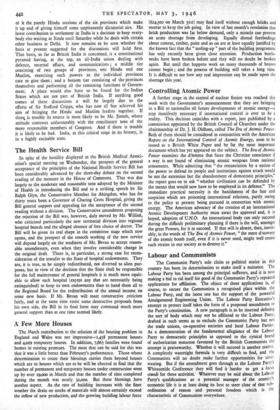Controlling Atomic Power
A further stage in the control of nuclear fission was reached this week with the Government's announcement that they are bringing in a Bill to nationalise all future developments of atomic energy—a step manifestly necessary if international control is ever to be a reality. This decision coincides with a report, just published by a commission appointed by the British Council of Churches under the chairmanship of Dr. J. H. Oldham, called The Era of Atomic Power. Both of them should be considered in conjunction with the American Report on the International Control of Atomic Energy, soon to be issued as a British White Paper and by far the most important document which has yet appeared on the subject. The Era of Atomic Power examines the dilemma that faces the Christian conscience if a way is not found of eliminating atomic weapons from national armaments. While admitting that " the renunciation by a nation of the power to defend its people and institutions against attack would be not the extension but the abandonment of democratic principles," the report goes on to ask " whether civilisation can be defended by the means that would now have to be employed in its defence." The immediate practical necessity is the banishment of the fear and suspicion which are poisoning international relations, partly owing to the policy at present being pursued in connection with atomic energy. The American advocacy of the creation of an international Atomic Development Authority must await the approval and, it is hoped, adoption of U.N.O. An international body can only succeed during the difficult preliminary planning if there is the will, amongst the great Powers, for it to succeed. If that will is absent, then, inevit- ably, in the words of The Era of Atomic Power, " the mere discovery of the atomic bomb itself, even if it is never used, might well create such strains in our society as to destroy it."






























 Previous page
Previous page